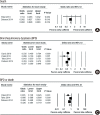Early Caffeine Use in Very Low Birth Weight Infants and Neonatal Outcomes: A Systematic Review and Meta-Analysis
- PMID: 26713059
- PMCID: PMC4689828
- DOI: 10.3346/jkms.2015.30.12.1828
Early Caffeine Use in Very Low Birth Weight Infants and Neonatal Outcomes: A Systematic Review and Meta-Analysis
Abstract
The use of caffeine citrate for treatment of apnea in very low birth weight infants showed short-term and long-term benefits. A systematic review and meta-analysis of the literature was undertaken to document the effect providing caffeine early (0-2 days of life) compared to providing caffeine late (≥3 days of life) in very low birth weight infants on several neonatal outcomes, including bronchopulmonary dysplasia (BPD). We searched MEDLINE, the EMBASE database, the Cochrane Library, and KoreaMed for this meta-analysis. The quality of the included studies was assessed using the Newcastle-Ottawa Scale and Jadad's scale. Studies were included if they examined the effect of the early use of caffeine compared with the late use of caffeine. Two reviewers screened the candidate articles and extracted the data from the full-text of all of the included studies. We included a total of 59,136 participants (range 58,997-59,136; variable in one study) from a total of 5 studies. The risk of death (odds ratio [OR], 0.902; 95% confidence interval [CI], 0.828 to 0.983; P=0.019), bronchopulmonary dysplasia (BPD) (OR, 0.507; 95% CI, 0.396 to 0.648; P<0.001), and BPD or death (OR, 0.526; 95% CI, 0.384 to 0.719; P<0.001) were lower in the early caffeine group. Early caffeine use was not associated with a risk of necrotizing enterocolitis (NEC) and NEC requiring surgery. This meta-analysis suggests that early caffeine use has beneficial effects on neonatal outcomes, including mortality and BPD, without increasing the risk of NEC.
Keywords: Bronchopulmonary Dysplasia; Caffeine; Infant, Newborn; Outcome; Very Low Birth Weight.
Conflict of interest statement
Figures



Similar articles
-
Inhaled versus systemic corticosteroids for the treatment of bronchopulmonary dysplasia in ventilated very low birth weight preterm infants.Cochrane Database Syst Rev. 2017 Oct 16;10(10):CD002057. doi: 10.1002/14651858.CD002057.pub4. Cochrane Database Syst Rev. 2017. PMID: 29035425 Free PMC article.
-
Inhaled versus systemic corticosteroids for preventing bronchopulmonary dysplasia in ventilated very low birth weight preterm neonates.Cochrane Database Syst Rev. 2017 Oct 17;10(10):CD002058. doi: 10.1002/14651858.CD002058.pub3. Cochrane Database Syst Rev. 2017. PMID: 29041034 Free PMC article.
-
Prophylactic or very early initiation of continuous positive airway pressure (CPAP) for preterm infants.Cochrane Database Syst Rev. 2021 Oct 18;10(10):CD001243. doi: 10.1002/14651858.CD001243.pub4. Cochrane Database Syst Rev. 2021. PMID: 34661278 Free PMC article.
-
Systemic corticosteroid regimens for prevention of bronchopulmonary dysplasia in preterm infants.Cochrane Database Syst Rev. 2017 Jan 31;1(1):CD010941. doi: 10.1002/14651858.CD010941.pub2. Cochrane Database Syst Rev. 2017. Update in: Cochrane Database Syst Rev. 2023 Mar 13;3:CD010941. doi: 10.1002/14651858.CD010941.pub3. PMID: 28141913 Free PMC article. Updated.
-
Systemic corticosteroid regimens for prevention of bronchopulmonary dysplasia in preterm infants.Cochrane Database Syst Rev. 2023 Mar 13;3(3):CD010941. doi: 10.1002/14651858.CD010941.pub3. Cochrane Database Syst Rev. 2023. PMID: 36912887 Free PMC article.
Cited by
-
Is Early Preventive Caffeine Safe and Effective in Premature Neonates? A Clinical Trial.Int J Pediatr. 2022 Jun 2;2022:8701598. doi: 10.1155/2022/8701598. eCollection 2022. Int J Pediatr. 2022. PMID: 35692738 Free PMC article.
-
Retinopathy of prematurity: a review of risk factors and their clinical significance.Surv Ophthalmol. 2018 Sep-Oct;63(5):618-637. doi: 10.1016/j.survophthal.2018.04.002. Epub 2018 Apr 19. Surv Ophthalmol. 2018. PMID: 29679617 Free PMC article. Review.
-
Caffeine in preterm infants: where are we in 2020?ERJ Open Res. 2020 Mar 2;6(1):00330-2019. doi: 10.1183/23120541.00330-2019. eCollection 2020 Jan. ERJ Open Res. 2020. PMID: 32154294 Free PMC article. Review.
-
Theophylline impact on weaning in oxygen-dependent infants followed in an outpatient Kangaroo Program.Front Pediatr. 2024 Aug 20;12:1344291. doi: 10.3389/fped.2024.1344291. eCollection 2024. Front Pediatr. 2024. PMID: 39228440 Free PMC article.
-
Protective Effects of Early Caffeine Administration in Hyperoxia-Induced Neurotoxicity in the Juvenile Rat.Antioxidants (Basel). 2023 Jan 28;12(2):295. doi: 10.3390/antiox12020295. Antioxidants (Basel). 2023. PMID: 36829854 Free PMC article.
References
-
- Gannon BA. Theophylline or caffeine: which is best for apnea of prematurity? Neonatal Netw. 2000;19:33–36. - PubMed
-
- Aranda JV, Beharry K, Valencia GB, Natarajan G, Davis J. Caffeine impact on neonatal morbidities. J Matern Fetal Neonatal Med. 2010;23:20–23. - PubMed
-
- Sacré L, Vandenplas Y. Xanthines in apnea of premature infants. Influence on gastroesophageal reflux. Arch Fr Pediatr. 1987;44:383–385. - PubMed
-
- Picone S, Bedetta M, Paolillo P. Caffeine citrate: when and for how long. A literature review. J Matern Fetal Neonatal Med. 2012;25:11–14. - PubMed
-
- Schmidt B, Roberts RS, Davis P, Doyle LW, Barrington KJ, Ohlsson A, Solimano A, Tin W Caffeine for Apnea of Prematurity Trial Group. Caffeine therapy for apnea of prematurity. N Engl J Med. 2006;354:2112–2121. - PubMed
Publication types
MeSH terms
Substances
LinkOut - more resources
Full Text Sources
Other Literature Sources
Medical

